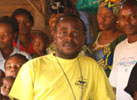23 October 2009
Goma — Looking at herself in the mirror, nine-year-old Helena squealed with delight at her reflection, standing upright with just the slightest support of her therapist. A year before, Helena was diagnosed with cerebral palsy and identified for therapy in Mugunga II IDP camp in Goma, eastern Democratic Republic of Congo. Helena, able only to crawl, had been confined to very specific spaces due to the lava in the IDP camp.
Helena was one of the lucky few to have received regular treatment. Robert Golden, a doctor, states in the 2008 UN Children's Agency (UNICEF) report, Monitoring Child Disability in Developing Countries, that it is an "important but largely unaddressed issue". This is especially true in DRC where child disability receives little attention among the myriad crises befalling the country.
According to the UN Organization for the Coordination of Humanitarian Affairs (OCHA), two million people are displaced in the eastern DRC. Combine this figure with World Health Organization (WHO) data that 10 percent of the world's population suffer some form of disability, and that would mean 200,000 disabled people among the displaced, many of them children.
"Attention and funding for programmes addressing disability are largely under-funded worldwide, and particularly in Congo," says Heal Africa's Laura Keyser.
"The international community might not see disability as an emergency worth focusing on now, but it will become a full emergency if nothing is done," said Loran Hollander of Heal Africa's hospital in Goma.
Increasing Risk Factors
While funding for treatment remains minimal for agencies specializing in treating disabilities, the number of disabled children and those at risk continues to grow due to the increased risk factors brought on by the breakdown of the health infrastructure, ongoing violence and displacement in the eastern DRC.
Minimal access to healthcare, clean water, and overall poor nutrition during pregnancy lead to common congenital disabilities in children such as spina-bifida and limb deformities, and young children predisposed to early childhood diseases such as meningitis and polio, explained Keyser.
Access routes to health centres are often blocked for patients and medical teams. This lack of access leads frequently to birthing complications, child developmental delays and maternal mortality.
Furthermore, the prevalence of rape in the DRC is also linked to a probable increase in child disability. "Frequently women pregnant from rape do not seek pre- or peri-natal care, which can lead to the problems aforementioned, as well as birth trauma - either to the baby (ie lack of oxygen leading to cerebral palsy or some type of developmental delay) or to the woman (ie a fistula, which may or may not leave them incontinent)," said Keyser.
Vulnerability
"Unfortunately, disabled children are more vulnerable to abuse, exploitation, neglect and discrimination. They face reduced social participation and have less access to education and other social services than children without disabilities," states Golden.
In addition, according to Handicap International and Heal Africa, inside the camps as well as outside, children with a disability struggle daily with social stigma and discrimination.
Proper treatment, according to UNICEF, Handicap International and Heal Africa, provides the children with the physical ability to function more fully in society while also educating the community to break down stigma and social restrictions.
UNICEF notes that "early detection and intervention might confer benefits to children at risk for disability and prevent long-term functional limitations".
Jusbeen, 4, came to the Heal Africa's clinic with a serious infection, a noma, which had "scarred down" his mouth, making it difficult to eat or drink. Therapists discovered that Jusbeen also suffered from developmental delays. However, since his disability was caught early, he has undergone a significant transformation. With ongoing therapy and constant encouragement from his mother, Keyser notes, "he is now able to walk with hand-held assistance, smiles, laughs and engages in play activities which were impossible before".
Due to minimal international attention to child disability amid the numerous crises afflicting the DRC, children like Jusbeen and Helena, who received treatment, remain among the minority. "These children need all the help they can get," says UNICEF. At present, that help is limited.
[ This report does not necessarily reflect the views of the United Nations ]
Copyright © 2009 UN Integrated Regional Information Networks. All rights reserved. Distributed by AllAfrica Global Media (allAfrica.com).








![[SB10001424052748704224004574488712286545606]](http://s.wsj.net/public/resources/images/OB-ET674_CONGO0_D_20091028181803.jpg)







































